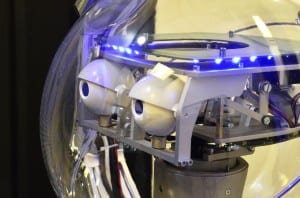A PhD student from the School of Computer Science was invited to present his research at one of the world’s most important conferences on human-robot interaction.
Christian Dondrup was just one of two students chosen to give a presentation at the prestigious HRI Pioneers workshop at the ACM/IEEE International Conference on Human-Robot Interaction, held at Bielefeld University, Germany, earlier this month.
More than 300 leading researchers from 25 different countries attended the conference to discuss new theories and research findings.
Topics ranged from developing naturally interacting robots, to visual attention in robotics systems and emotional robots.
Christian said: “Being selected to give one of the talks and present a poster was a huge honour for me and it was a fantastic experience to talk in front of all the PhD students pioneering in HRI and the selected keynote speakers. It was also a great opportunity for networking to foster future collaborations.”
His research focusses on developing a robot which can adapt its spatial behaviour over time according to the environment it is working in.
Christian said: “The motivation for this research stems from the future vision of being able to buy a mobile service robot for your own household, unpack it, switch it on, and have it behave in an intelligent way; but of course it also has to adapt to your personal preferences over time. My work is focusing on the spatial aspect of the robot’s behaviours, which means when it is moving in a confined, shared space with a human it will also take the communicative character of these movements into account. This adaptation to the users preferences should come from experience which the robot gathers throughout several days or months of interaction and not from a programmer hard-coding certain behaviours.”
Christian has been using ‘Linda’ the robot, from the Spatio-Temporal Representations and Activities for Cognitive Control in Long-term scenarios (STRANDS) project, to test and validate the developed algorithms. Linda will be deployed in an elder care home over several months to gather this experience.
The multi-million pound STRANDS project involves computer scientists from the University of Lincoln and a number of European partners, including security company G4S Technology Ltd and the Academy of Ageing Research, an Austrian care home provider.
The aim is to create mobile robots that are able to operate intelligently and independently, based on an understanding of 3D space and how this space changes over time, from milliseconds to months.
Another part of Christian’s research is looking for implicit cues that occur during natural interaction between human and robot, and finding indications for so-called hesitation signals.
These occur during Human-Robot Spatial Interaction (HRSI) when the human participant is confused by the robot’s behaviour which can lead to annoyance very quickly.
This study was conducted in collaboration with the School of Sport and Exercise Science at the University of Lincoln using high precision motion capture cameras.
In a mock-up restaurant scenario, the participants were put into the same confined shared space with Linda and played waiters, delivering drinks while Linda was taking orders from the supposed guest.
The team evaluated the reaction of the participants to different behaviours the robot showed and found indications for these hesitation signals when the robot was behaving in an unsocial way.
Christian also presented these preliminary results to the conference and the resulting so-called “Late Breaking Report” paper was one of six out of 109 nominated for the best paper award.
